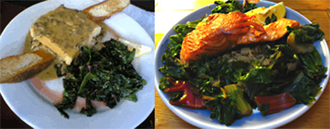Selection and storage
Swiss chard is available at its best during the summer months from June until October. Chard can be harvested while its leaves are young and tender or after maturity when the leaves are larger and attain slightly tougher stems. In the store, buy fresh chard leaves featuring crispy, crunchy, brilliant dark-green color.
Chard is an extremely perishable leafy vegetable, and for the same reason, it should be used as early as possible once harvested. If at all to store inside the refrigerator, then, set its temperature below 35 degrees F and high humidity level to retain vitality for 1-2 days.
Preparation and serving methods
 |
| Potato-soy pie with chard. Photo courtesy: George Kelly., and Chard-salmon recipe. (Photo-by selena) |
As in spinach, chard leaves should be washed thoroughly in clean running water and rinsed in saline water for about 30 minutes in order to remove sand, dirt, and any insecticide/fungicide residues.
Here are some serving tips:
-
Fresh young chard leaves can be used raw in salads.
-
Mature chard leaves and stalks are typically cooked, braised, or sautéed; the bitter flavor fades with cooking. However, antioxidant properties of chard may significantly diminish on steaming, frying, and boiling for long periods.
-
Silverbeet pie, with pistachio, raisins, cheese stuffing (filling) is a favorite Italian and Mediterranean region.
Safety profile
-
Because of its high vitamin-K content, patients on anticoagulant therapy such as warfarin are encouraged to avoid chard in the food since it increases the vitamin-K concentration in the blood, which is what the drugs are often attempting to lower. It, thus, effectively raises the dose of the medicine and may cause overdosage toxicity.
-
Swiss chard contains oxalic acid, a naturally occurring substance found in some vegetables, which may crystallize as oxalate stones in the urinary tract. Therefore, people with genetic susceptibility to oxalate stones are advised to avoid chard in their diet. Adequate intake of water is encouraged to maintain normal urine output. (Medical disclaimer).
≺≺ Back to Vegetables from Swiss Chard nutrition. Visit here for an impressive list of vegetables with complete illustrations of their nutrition facts and
health benefits.
≺≺ Back to Home page.
Further reading:

